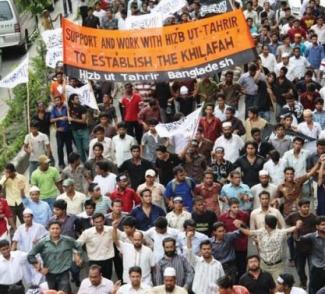Hizb-ut-Tahrir Bangladesh: Transnational Islamist Movement
Hizb ut-Tahrir (Party of Liberation) is a transnational Islamic religious-political organization that has a presence in over 20 countries across the world. HT was founded in Jerusalem in 1953 by Taqi al-Din al-Nabhani. HT believes in the Ummatic concept. Its website openly declares that: "It aims to revive the Islamic Ummah from the severe decline that it had reached and to liberate it from the thoughts, systems and laws of Kufr, as well as the domination and influence of the Kufr states. It also aims to restore the Islamic Khilafah State so that the ruling by what Allah revealed returns."
The Bangladesh chapter of Hizb-ut-Tahrir (HT-B) came into existence sometime in the year 2000 and got noticed following the American response to the 9/11 (September 2001) terrorist attacks. Its objectives have been to establish the Caliphate as part of the “Khilafah Islamiyah”. It also wants the Judiciary to be controlled by Islamic Sharia laws. The organisation began its activities inside Bangladesh with support from UK-based HT. The HT-B has been trying to capture political power by influencing and infiltrating the Bangladesh Army. Despite remaining as a proscribed organisation, the group continues its anti-state and anti-government campaigning. For example, in December 2013, HT-B organised talks in nine mosques across the country and appealed the Army to overthrow the AL and BNP regime. The HT-B brand these parties are gents of Western and Indian governments. It criticizes democracy as a government of devils.
The Bangladesh government has imposed a ban on the Hizbut-Tahrir’s country chapter on October 22, 2009, for its 'anti-state', 'anti-government', 'anti-people' and 'anti-democratic' activities in the country. The government, however, ruled out the possibility of charging Hizb ut-Tahrir- Bangladesh (HT-B) activists for their past offences in the country but warned them of grim action if they continue their anti-state activities further. In the last, the HT-B criticized the present government in the following words: "The oppressive Awami League government, agents of US-India-Britain banned Hizb ut-Tahrir due to the party’s stance on the side of the defence forces of the country and leading the work for re-establishing the Khilafah (Caliphate)."It was under the scanner for its involvement with proscribed Jama'atul Mujahideen Bangladesh (JMB) Hizbut Towhid and other Islamic terror organizations. The Dhaka University professor Mohiuddin Ahmed, who is the chief of HT-B, denied the allegations brought against the organisation in a statement released by the group. It claimed that the outfit would continue with its movement for a Muslim Ummah. According to Mohiuddin Ahmed's revelation, HT-B has units at all divisional headquarters and have around 10,000 members across the country.
HT-B became the fifth militant outfit to be outlawed in Bangladesh, following Harkat-ul-Jihad-al-Islami, Jama'atul Mujahideen Bangladesh, Jagrata Muslim Janata Bangladesh and Shahadat-e Al Hikma. seven other organisations, such as Hizb-ut-Towhid, Islami Samaj, Ulema Anjuman al Baiyinaat, Islamic Democratic Party, Tawhid Trust, Tamir ud-Deen and Alla’r Dal, were also blacklisted in 2009 for their suspected involvement in militant activities. Just before the ban, around 40 cadres of the HT-B were arrested for distributing leaflets in support of the border guard’s mutiny, in which around 50 army officers were killed. The HT-B has consolidated its hold in Bangladesh by taking advantage of frequent political instability and misgovernance. During its public appearances and programmes in the mosques, the outfit appealed to its supporters to give it an opportunity to rule the country. It promised to address all the existing social and economic problems after establishing a Khilafat in Bangladesh. It has student wings in all the universities of Bangladesh and a major portion of its support comes from among the rural youth. The rural unemployed youth make up are its ready recruits. These youth are getting regular training for Jihad.
The outside world witnessed HT-B rise to prominence in 2004 and during the Muhammad cartoon controversy in 2007. The counter-terror unit of Bangladesh found out the statements of HT-B and Jama'atul Mujahideen Bangladesh (JMB) are similar in nature.
The HT-B operations pass through three stages. First, the party tries to educate and spread awareness about its objectives among the masses in search of a dedicated and committed cadre. Second, the dedicated cadre interacts with the masses to encourage them to embrace Islam. The third objective is to establish a Caliphate. While progressing from one stage to another, the outfit adopts a strategy that is a combination of military and political campaigning. Although the outfit discards violence, on several occasions, the HT-B cadres are arrested for their involvement in subversive activities or with arms and ammunition within Bangladesh. Interestingly, in January 2012, the Bangladesh Army revealed that a coup planned by some middle-level officials, allegedly with the support of the HT-B to establish the Khilafat, was foiled.
The HT-B leaders in Bangladesh are in constant touch with its UK branch. They get both material and moral support from them. The outfit also gets regular contributions from their sympathizers. Media reports have indicated that the HT-B is one of the richest organisations in Bangladesh and gets millions of Bangladeshi Taka (National Currency) from unknown sources. The Bangladeshi intelligence agencies suspect that the outfit even has linkages with Al Qaeda.
